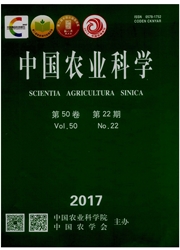

 中文摘要:
中文摘要:
【目的】籽粒硬度是小麦市场分级和定价的重要依据,影响磨粉和食品加工品质。CIMMYT是我国最重要小麦51种地之一,研究其硬度基因型对我国小麦51种具有重要的应用价值。【方法】以CIMMYT常用的236份小麦亲本和高代品系为材料,采用改进的颗粒指数法、特异5I物的PCR扩增和改进的SDS—PAGE凝胶电泳对其SKCS硬度及其puroindoine基因型进行鉴定和分析。【结果】202份硬质麦中,165份为PINA蛋白缺失类型;37份为Pinb-D1B类型,其中19份为非CIMMYT材料,18份亲本中均含有非CIMMYT材料。在34份软质麦中,有野生型、Pina—D1a/Pinb—D1i、Pina—D1c/Pinb-B1h、Pina—D1j/Pinb—D1i秘Pina—D1a/Pinb—D1j共s精基因型,两种硬质类型中,Pina-D1b类型胚乳硬质程度明显高于(PSI硬度显著低于)Pina-D1b类型;4种软质类型中,Pin8-D1C/Pinb-D1h和Pin8一D18/Pina-D1i类型胚乳硬质程瞍显著商于(PSI硬暖显著低于、Pina-D1j/Pinb-D1i和Pina-D1i/Pinb-D1i类型。通过分析各类型的puroindoline基因序列发现,Pinb-D1b和Pinb-D1i编码同一种氨基酸,突变后仍表现为软质是因为第28位精氨酸变成色氨酸,其余软质变异类型色氨酸丰富区附近均未发生变化,这可能是导致其胚乳质地仍未变硬的主要原因。【结论】在先前研究基础上,本试验对CIMMYT小麦基因型作了进一步分析,发现系谱中没有外源材料的所有CIMMYT硬质麦均为Pina-D1b类型。从山羊草引进的软质突变类型之间存在一定硬度差异。
 英文摘要:
英文摘要:
[ Objective ] Grain hardness, controlled by a hardness (Ha) gene, serves as a basis for classification and marketing of common wheat (Triticum aestivum L.) quality and has a profound effect on milling and end-use quality. CIMMYT is one of the most important places that regularly offer germplasm to Chinese wheat breeding program. This study can provide useful information to introduce wheat to China. [Method] A total of 236 wheat lines from CIMMYT crossing program, including common wheat cultivars and advanced lines derived from synthetic hexaploid wheat × common wheat crosses, are used to detect variation of puroindoline alleles by specific-primers PCR amplification and modified SDS-PAGE. PSI (particle size index) hardness was also measured for 160 genotypes. [Result] Results indicated that 165 hard wheat lines are Pina-Dlb types and the remaining 37 are Pinb-Dlb types, which are non-CIMMYT cultivars or their pedigrees contain non-CIMMYT cultivars. Pina-D1j/Pinb-D1i,Pina-D1c/Pinb-D1h, Pina-D1a-Pinb-D1i, Pina-D1a-Pinb-D1j, and wild type (Pina-D1a/Pinb-D1a) are present in 34 soft types. Genotypes with Pina-Dlb are significantly harder (lower PSI hardness) than genotypes with Pinb-Dlb. Genotypes with Pina-D1c/Pinb-D1h and Pina-D1a/Pinb-D1i are significant harder (lower PSI hardness) than genotypes with Pina-D1j/Pinb-D1i and Pina-D1a/Pinb-D1a. In addition, both Pinb-D1h and Pinb-D1i encode the same polypeptides and a tryptophan substitute (arginine) at position 28, which is the major reason for soft endosperm. In comparison with wild type (Pina-Dla/Pinb-Dla), no change was found in close to tryptophan-rich domain ofpuroindoline in other soft genotypes except for Pinb-D1h and Pinb-D1i, which may be the main reason that mutation types still remain soft endosperm. [Conclusion] It is concluded that all of Pinb-Dlb types are non-CIMMYT cultivars or their pedigrees contain non-CIMMYT cultivars and PSI of puroindoline alleles from Ae.tauschii are difference.
 同期刊论文项目
同期刊论文项目
 同项目期刊论文
同项目期刊论文
 期刊信息
期刊信息
